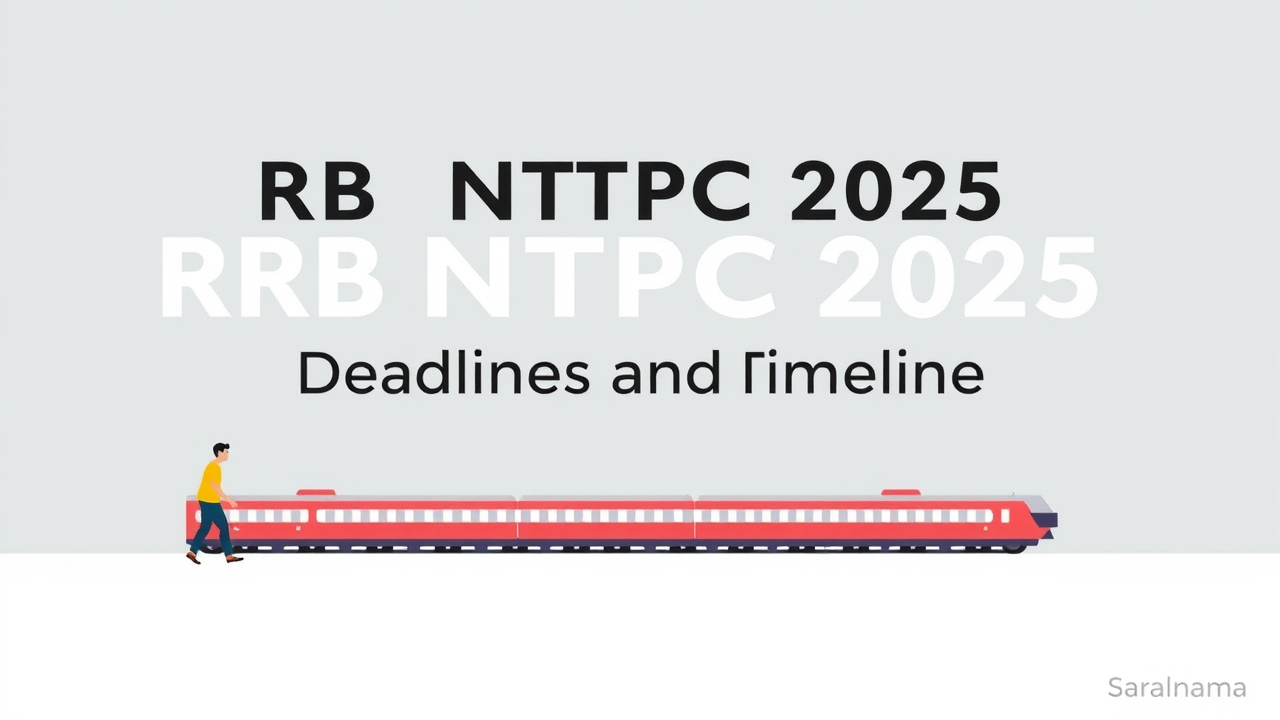The Railway Recruitment Boards (RRBs) are concluding the RRB NTPC Apply Online 2025 process today, November 27, for graduate and undergraduate posts. Candidates have a crucial opportunity to apply for various non-technical positions across different railway zones. Interested applicants must complete their online applications and pay fees by the specified deadlines, with careful attention to eligibility criteria and document requirements.

RRB NTPC 2025: Critical Application Deadlines and Timeline
The RRB NTPC application process for 2025 is entering its final stages, with multiple important dates for candidates to remember. The last date to submit applications is November 27, 2025, with the fee payment window extending until November 29, 2025. After the main application deadline, a correction window will be available from November 30 to December 9, 2025, allowing registered candidates to modify their submitted forms. Candidates must carefully note these dates to avoid missing this significant recruitment opportunity. The Railway Recruitment Boards have emphasized that no extensions will be provided unless officially announced, making it crucial for applicants to complete their applications within the specified timeframe.
Detailed Eligibility Criteria for Graduate and UG Posts
Candidates applying for RRB NTPC 2025 must meet specific educational and age requirements. For undergraduate posts (Level 2 & 3), applicants must have completed Class 12 from a recognized board, with an age range of 18 to 30 years. Graduate posts (Level 4, 5 & 6) require a bachelor's degree from a recognized university, with candidates aged between 18 to 33 years. Various relaxations are available for reserved category candidates as per central government norms. The recruitment covers multiple non-technical positions like Junior Clerk, Accounts Clerk, Traffic Assistant, and Station Master, offering opportunities across different railway zones.
Application Fee Structure and Payment Guidelines
The RRB NTPC 2025 application fees are categorized to provide concessions for specific groups. General category candidates must pay INR 500, while candidates from reserved categories like SC/ST, PwBD, Ex-Servicemen, Transgender, and minority communities are required to pay only INR 250. Payment can be made online through various modes, including net banking, credit/debit cards, and UPI. Importantly, candidates who appear for the first stage Computer Based Test (CBT) will be eligible for a fee refund. Applicants are advised to keep their payment receipts and follow the official guidelines carefully to ensure a smooth application process.
Step-by-Step Online Application Process
To successfully apply for RRB NTPC 2025, candidates must follow a systematic approach. Begin by visiting rrbapply.gov.in and selecting the appropriate recruitment notification (CEN 06/2025 or CEN 07/2025). Complete the registration by entering personal details, creating a login ID and password. After logging in, carefully fill the application form, ensuring all information is accurate. Upload scanned copies of photographs and signatures according to specified dimensions. Select the preferred RRB zone meticulously, as this cannot be changed later. Candidates should have documents like educational certificates, ID proof, and category certificates ready before starting the application.
Examination Pattern and Selection Stages
The RRB NTPC 2025 selection process is comprehensive and involves multiple stages. Candidates will first appear for a Computer Based Test (CBT-1), followed by a second stage CBT. Some posts will additionally require a typing skill test or Computer Based Aptitude Test (CBAT). There will be 0.25 negative marking for incorrect answers in both CBT stages. The examination will likely be conducted in multiple regional languages, including English and Hindi. Candidates should prepare thoroughly, focusing on reasoning, mathematics, general awareness, and technical knowledge relevant to their chosen posts.
Important Documents and Verification Process
Candidates must be prepared with a comprehensive set of documents for the RRB NTPC 2025 recruitment. Essential documents include Class 10, 12, and graduation certificates, valid government ID proof (Aadhaar/Passport/Voter ID), category certificates for reserved category candidates, and recent passport-sized photographs. During document verification, candidates will need to provide original documents matching the details submitted in the online application. Passport-sized photographs must meet specific size and dimension requirements. Careful documentation and adherence to guidelines will be crucial for successfully clearing the verification stage.
Salary Structure and Career Growth Prospects
RRB NTPC 2025 offers attractive salary packages across different levels. Positions range from Level 2 to Level 6, with basic pay starting between INR 19,900 and INR 35,400. In addition to basic salary, candidates will receive allowances like Dearness Allowance (DA), House Rent Allowance (HRA), and Travel Allowance (TA). The positions offer significant opportunities for career progression within the railway sector. Successful candidates can expect job security, regular promotions, and potential transfers across different railway zones. The recruitment provides an excellent entry point for candidates seeking a stable government job with long-term growth potential.
Preparation Tips and Exam Strategy
Candidates preparing for RRB NTPC 2025 should adopt a strategic approach. Focus on comprehensive study materials covering reasoning, quantitative aptitude, general awareness, and technical knowledge. Practice previous years' question papers and take mock tests to improve time management and accuracy. Utilize online resources, study guides, and reference books specifically designed for railway recruitment exams. Pay special attention to current affairs, basic mathematics, and logical reasoning. Develop a consistent study schedule, allocating time for each subject area. Candidates should also stay updated with the official RRB notifications and prepare mentally for the competitive selection process.
Source: Link
